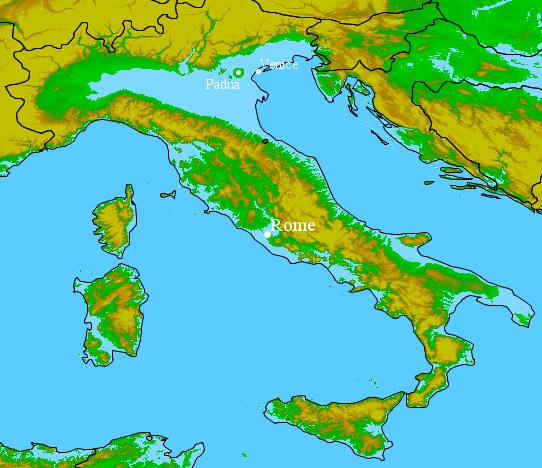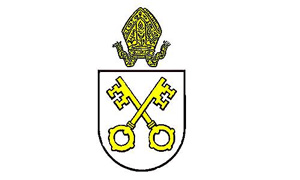Italian States
There is no single nation of “Italy” as we know it today. Instead, the Italian provinces are divided up between many smaller Republics, Principalities, Dukedoms and other city-states which function as centres of trade and learning (and fighting between each other). It all gets exported (learning AND fighting) to the rest of Europe too - the scientific advances that the Italians have made, particularly Invention and Alchemy, continually impress the rest of Europe. Many students of the Maltese College of Magics choose an Italian city as their centre of further studies and this has visibly benefited the states.
Much of the Western coast of Italy was drowned by the Great Flood in the opening decades of the 17th Century. The civil unrest following the various religious and political crises caused many hundreds of Italians to take refuge in Spain, and others to flee to the mountains, where the quiet vineyards and olive groves of the hill-farmers struggled to cope with the influx of refugees. The cities that remain were divided by geography as well as politics; separated by the waters, few Italian city-states trust their neighbours, and frequent wars are fought over the dry territories that remain.
Venice
During the Flood, any idea that Venice might be raised out of the scope of the rising waters was abandoned as soon as the philosophers of the city considered the task. Instead, the shipbuilders, gondoliers and Magicians of the town bent their minds to constructing a series of rafts and linked boats, using every scrap of timber that could be salvaged or bought; what began as a temporary attempt to save the citizenry, who might then be shipped to safer climes, rapidly grew into a permanent fixture. In a shaky alliance with the Doge, the Gondoliers’ Guild shored up their floating haven, sinking pilings deep into the lagoon and using the latest advances in Alchemy and Invention to make even the most waterlogged of wood - and sometimes even stone and clay - float serenly on the surface of the waters.
In the years after the flood’s end, Venice has become a less beautiful state, but a more brilliant one; the Glassblowers’ guild house is particularly impressive, as endless, fuelless alchemical fires roar day and night, fusing sand and melting glass but never causing so much as a scrap of wood or paper to ignite and endager the floating wooden shanty-town. To this day, the floating city of Venice, moored safely in the lee of the lagoon, is a haven for artists, madmen, dreamers, heretics and and criminals who wish to lose themselves in its endless warrens and the creaking, rope-filled darkness between boats. Many Alchemists and other philosophers who require glass alembics or equipment in their experiments refuse to use any but Venetian make.
Rome
It is said that the greatest Theurgists of the age may be found in Prague, but that the most enthusiastic are the Roman. Old men who were present at the event somewhat poetically referred to as the Drowning of the Tiber in 1608 tell of the swarms of angels, filling the air like hummingbirds, who descended from Heaven at the behest of the Vatican’s magicians, and with the divine power of Creation raised the very Hills themselves above the floodwaters. Rome now stands proud on seven islands, linked by impossibly delicate silver-filligree bridges criss-crossing many yards above the waves, which shine with a celestial glow even in the dark. Much of the Vatican itself is still underwater, but a series of Theurgically enhanced shield-walls and subterranean defences keep the cellars and libraries of the ancient buildings dry and free from interference.
Padua
The salvation of Padua is largely attributed to a young Astrologer by the name of Galileo Galilei, whose observations of the Heavens and the resultant horoscopes led to such brilliant predictions concerning the extent of the flood, and the various methods by which Padua might be saved. There are occasional rumours that Galilei - who died in 1641, shortly after retiring as Chancellor of the justly-famed University of Padua - engaged in banned Witchcraft to enhance his predictions; and certainly, the spirits which preserved Padua through the crisis - and raised the earth around the city in a barrier so effective that even now, clean water and dry land are as common in the Paduan “bowl” as they are scarce in the rest of the Veneto - seemed more Familiar than Angelic in nature. Whatever the cause, the complicated series of locks and docking-ports that allow ships to safely descend into the Paduan Bowl, while keeping the floodwaters firmly outside, are the results of pure Inventive ingenuity; and whether it was truly his work or that of a talented apprentice, the citizens of Padua still call Galilei the “Heir of da Vinci”.
The Hill Country
The hilly regions of the Apennine and Alpine mountains are home to many farmers struggling to tame more and more land into vineyards, olive-groves and grazing-space. The scattered communities across these areas are frequently lawless, although delegations from Rome, Padua or one of the other surviving cities regularly attempt to bring them under the control of one Principal power or another. The wooded slopes of many of these mountains are a haven for petty warlords and religious fanatics, and the internal conflicts of the place make them appear more like some of the Austrian principalities than their former ordered, pastoral calm. Border-wars are frequent, bloody and often petty, and mercenaries can find good work in the employment of one or another self-proclaimed “Duke”, “Prince” or “Regent”.
The Papal States
The Papal States are under the control of the Papacy, providing the Catholic centre with lands and revenues. These are an indication of the strength of the Pope and his influence on the European world.
Since the Regicide, the relations between the Pope and Albion have been at an all-time low. Rome occasionally goes so far as to send a disapproving Cardinal as a Mission to the Court in Oxford, to glare at the nobles and loudly declare the Kingdom apostate and damned, but for the most part the two nations bitterly ignore one another.
Relations with Albion
On the whole relations are as good as can be between Catholic and Protestant nations; that is to say, tense, but not outright hostile. There is little to argue over, and Albion and the Italian States usually respect each other because neither is the other's business. Rome consistently sends out dictates declaring King Matthew a heretic and all subjects of Albion traitors to Holy Mother Church, but most people understand that there is little true political risk to be taken from the Italian states - an attack is far more likely to come from Spain, Portugal or the Holy Roman Empire.
Most of the States have an Embassy in Oxford; the smaller ones in particular have a reputation for hard drinking and prodigious acts of courtship, which makes those Archipelago nobles with particularly susceptible wives (and, in some cases, husbands) extremely nervous.


